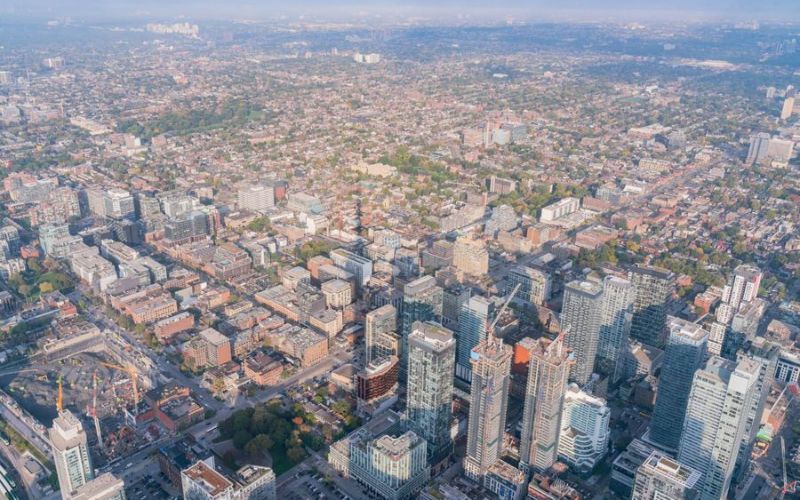When it comes to living in a major city like Toronto, condos are the most viable option for many people. Not only are they more affordable than a full house, but they are also available in much higher numbers and with many more options. In Toronto alone, thousands of new condo units are being developed each year and are sold or rented to residents.
If you must live in the city and are not able to pay the high asking prices for real estate in Toronto, you should very seriously consider a condo. However, the next question is: rent or buy? Generally, buying is preferred when you have the money as you will get to enjoy all the benefits that come with property ownership. But not everyone has enough money to buy a condo or is able to get approved for a mortgage and choose instead to rent a space to live in the city.
There is an option that combines both of these: rent-to-own, also known as lease-option agreements. Rent-to-own is exactly what it sounds like: you pay rent up to a certain amount, at which point you can take ownership and mortgage the property.
While this option was not very common in the past, it’s becoming more popular as people struggle to save up for high down payments that our real estate market demands. Let’s explore more about rent-to-own in Toronto so you can decide if this option is right for you.
About the Toronto condo market
Condos are one of the hottest markets in the city of Toronto. When it comes to condos, Toronto has no shortage of variety. According to the Toronto Regional Real Estate Board (TRREB), over 7,800 condos were sold in Q3 2021 alone, with an average price of almost $690,000.
In Toronto, rent for an average single-bedroom apartment costs about $2,000 a month but can go much higher depending on the area and building amenities.


It’s possible to get a mortgage for which the monthly payments are comparable to what you would pay for rent. Though you could end up paying more due to closing fees, property tax, and utilities, you are also paying into your home’s equity rather than paying rent that provides you with no future value.
How does rent-to-own work?
In a rent-to-own agreement, a portion of your monthly rent goes towards a future down payment on the condo. Once you have paid enough into the down payment, you are able to take ownership and begin paying a mortgage instead of rent. The amount required for the down payment and how long you have to pay it will depend on the contract. Rent-to-own is not available for every condo, only those who specifically offer the agreement.
The rent-to-own option is good because rather than trying to save a down payment while you rent, you can do both simultaneously. You also don’t have to move and get to keep living in the same condo you now own, which is a great benefit if you love where you live.
How is rent-to-own different from a down payment and mortgage?
Rent-to-own is not the same thing as a mortgage. For one, you do not have any debt in a rent-to-own agreement, and you are paying the property owner instead of one of the major banks. In addition, you are only saving for the down payment amount, whereas a mortgage loan is usually a much larger percentage of the condo price.
Finally, there are different requirements to be approved for a rent-to-own lease as opposed to a mortgage. This makes rent-to-own more appealing for the self-employed, people with bad credit scores, or new immigrants without a credit history. Renting to own can also give you the time to improve your credit score or save while you work towards your home purchase.
It is also likely that you will need to take on a traditional mortgage once you take ownership, meaning you should fully understand both processes before signing a lease-option agreement.
Can I rent-to-own in the city of Toronto?
Yes, in Toronto renting to own is possible just like anywhere else. However, you should know that not every condo will have a rent-to-own option. Rather, you will need to seek out specific properties that offer these agreements.
This may somewhat limit your choices, which may be frustrating if you are looking for the perfect condo that you plan to live in for years to come. The issue is that with such a hot real estate market, many owners are not interested in selling their condos, and those who do can easily find a buyer and get the value of their property immediately. Most pre-construction condos are sold before they are even built. For this reason, rent-to-own is usually offered on less desirable properties that may otherwise have trouble selling. However, as the market shifts, this can change.
“I’ve been doing this for 17 years, and I used to see a lot of those deals when it was less of a seller’s market than it is today,” said Ryan Coyle, founder of Connect.ca, a brokerage specializing in condo sales in Toronto and the GTA ” but as far as I know, it’s pretty much non-existent in Toronto currently.”
Are there risks to a rent-to-own program?
One thing you need to know before opting for a rent-to-own agreement is the possible risks involved.
Possibility for scams
Rent-to-own agreements can be vulnerable to scams and contracts gone wrong. Unlike mortgages, rent-to-own programs are not as widely regulated and understood, allowing opportunistic landlords to take advantage of tenants. Since rent-to-own appeals to people who have few other options, they are vulnerable to getting a bad deal. Consider consulting independent legal advice before signing any lease-option agreement.

Options to break your contract
You should also be aware of the terms of your rent-to-own program. While some contracts merely offer you the option to buy the home at the end of your contract, others make buying the home an obligation upon the end of the term.
This means that if you need to move out early or have second thoughts about the property, you will need to somehow get out of the contract. You may be able to do so, but you may also lose any fees or deposits that you provided along with the contract, and possibly the amount you put towards the down payment.
Price fluctuation risks
There is also some risk involved with the price you end up paying. Generally, the future value for a unit is agreed upon prior to the lease and is a fair estimate. However, value loss could mean that you end up paying more than you should for the property.
When is rent-to-own worth it?
Generally when it comes to buying a property, getting a mortgage with favourable terms will always be the best option. Unfortunately, this option is not available to many either due to a poor credit score, bad financial conditions, or lack of savings for a down payment.
In this case, rent-to-own is a valid alternative avenue to homeownership. It is also effective for those who have trouble saving as it gives you a clear goal you are saving towards and makes the process nearly automatic.
Rent-to-own is not for you if you can afford a standard mortgage. There is little benefit in continuing to rent rather than taking on your mortgage as soon as possible. It’s also not a good option for people who do not plan on living in the city for good. The City of Toronto is one of the most expensive real estate markets and comes with all the inconveniences of a busy crowded city. If you plan on settling outside the city one day, it may be worth it to just rent until you can afford your own home elsewhere.
Rent to own is also not the best play for someone looking for real estate for purely investment purposes. For those looking to invest in condos, something like a pre-construction purchase may be more viable, where you are able to make multiple smaller down payments towards the property, and you have more time to save for the purchase. For more info on pre-construction condos in the GTA, expert advice, and access to new developments, visit Connect.ca.
Corben joined CREW as a relative newcomer to the field of real estate and has since immersed himself and learned from the experts about everything there is to know on the topic. As a writer with CREW, Corben produces informative guides that answer the questions you need to know and reports on real estate and investment news developments across Canada. Corben lives in Guelph, Ontario with his partner and their two cats. Outside of work, he loves to cook, play music, and work on all kinds of creative projects. You can contact Corben at corben@crewmedia.ca or find him on Linkedin at https://www.linkedin.com/in/corbengrant/.









